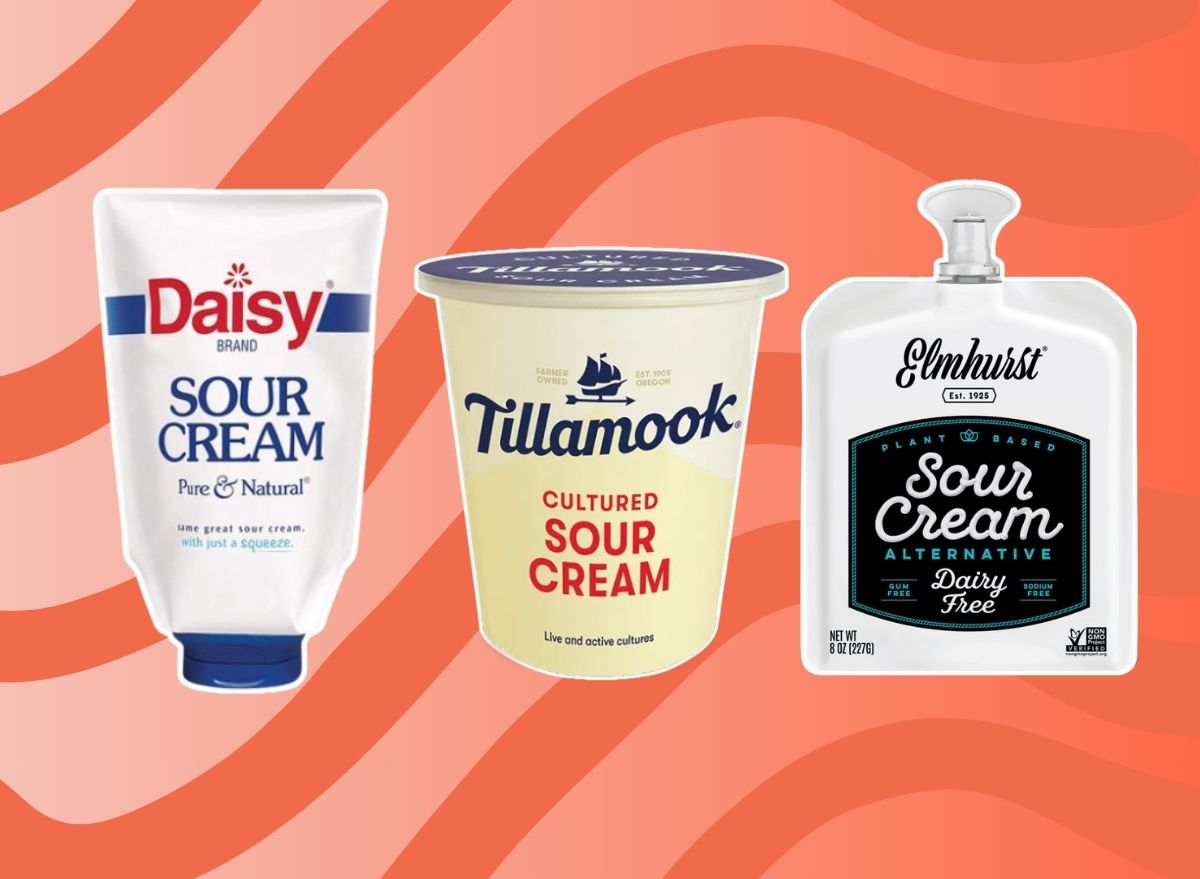The product recommendations in this post are recommendations by the writer and/or expert(s) interviewed and do not contain affiliate links. Meaning: If you use these links to buy something, we will not earn a commission.
Do we ever use the term “dollop” for anything else other than sour cream? As a dairy product that has its own noun, sour cream holds a special place in the American diet. After all, Americans eat a whopping 1.5 billion pounds of the stuff each year. And with the rise of plant-based lifestyles, even dairy-free sour creams are skyrocketing, appearing all across the refrigerated section. Sour cream and its dairy-free alternatives are creamy and mildly tangy, making them the ultimate versatile food to top your baked potato or chili or serve as the base of your favorite dip.
Sour cream is crafted in two main styles. The first is cultured sour cream, “which uses a bacteria culture to convert lactose and is not less than 8% milkfat,” says Toby Amidor, MS, RD, CDN award-winning nutrition expert and Wall Street Journal bestselling author of Up Your Veggies: Flexitarian Recipes for the Whole Family. The other way to make sour cream is through the utilization of an “acid addition to make the milk more acidic and lactose remains in the finished product,” continues Amidor. These sour creams are then offered in a wide variety of fat quantities, as defined by Amidor—Reduced fat (13.5% fat), light (9% or less fat), low fat (6% or less fat), and nonfat (1% or less fat).
Like all foods–and dairy products, at that–some brands are simply better for your health than others. Certain companies may adhere to stricter production methods, farming standards, and nutrition, while others may add a host of unnecessary additives to their product (whether or not these additives are benign).
It can be overwhelming to choose which sour cream is best for your specific health needs, so we’ve gone ahead and picked out the best (and some of the worst) sour creams so that you don’t have to.
How We Chose the Best Sour Cream
We followed strict criteria when choosing the best sour creams on the market to ensure both quality taste and ultimate health.
- Low Sodium: Sour cream is usually low in sodium, but many brands like to sneak in excess sodium to enhance flavor and get consumers hooked. All of our recommended sour cream brands boast 20 milligrams or less of sodium which may help you stay on track toward meeting your health goals. It’s important to note that the American Heart Association recommends no more than 2,300 milligrams a day for the average adult and promotes an ideal of 1,500 milligrams per day. If you’re currently experiencing hypertension (high blood pressure), it’s important to talk to your healthcare provider about how much sodium you should consume per day.
- Simple Ingredients: To put it frankly, there’s nothing wrong with having “complicated” ingredients. Just because you can’t pronounce an ingredient doesn’t mean it’s bad for you. Really, it just depends on what the ingredient is used for and how much of it is actually in your food. However, we wanted to keep it simple to make it easier for you to choose a healthy sour cream. All of the “best” sour creams on this list have simple, easy-to-read ingredients that are naturally derived and won’t leave you guessing.
- Relatively Low in Saturated Fat: Saturated fat, which is fat that solidifies at room temperature, is natural in dairy products. However, too much saturated fat can lead to a slew of health issues, including cardiovascular disease. Therefore, the AHA recommends no more than 13 grams of saturated fat per day. A couple of dollops (or two tablespoons) of our favorite sour creams will put you at about 4.5 grams or less. If you eat these products in moderation, you should be just fine in the health department, and remember to eat nutrient-dense foods alongside your dairy products such as vegetables, whole grains, and legumes.
The Best Sour Creams
Best: Daisy Sour Cream
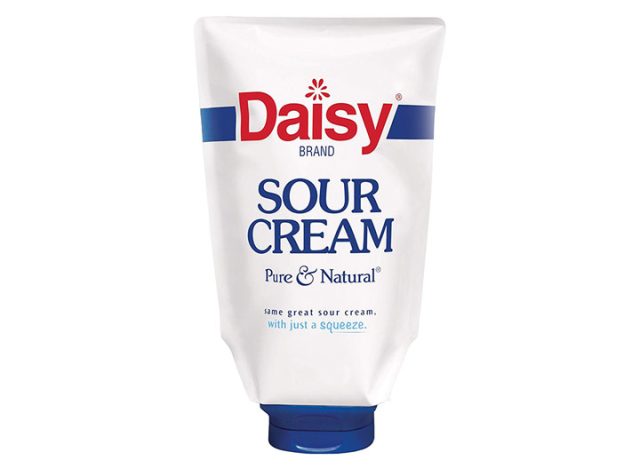
Per 2-tbsp serving: 60 calories, 5g fat (3.5 g saturated fat), 15mg sodium, 1g carbs (0g fiber, 1g sugar), 1g protein
With a creaminess and flavor that complements any food it’s paired with, Daisy Sour Cream enhances the overall eating experience. Made with only one ingredient–cultured cream—Daisy Sour Cream is free from preservatives, stabilizers, gums, and thickeners.
Best: Tillamook Cultured Sour Cream
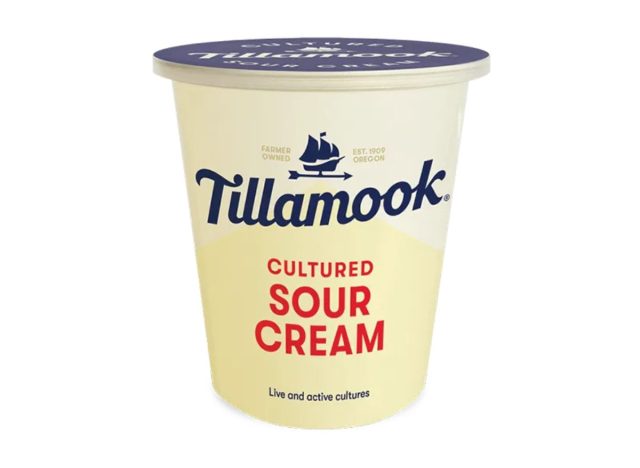
Per 2-tbsp serving: 60 calories, 5 g fat (3 g saturated fat), 10mg sodium, 2g carbs (0g fiber, 1g sugar), 1g protein
With slightly lower sodium levels than other brands, Tillamook’s Cultured Sour Cream is made with rBST-free milk and slightly more butterfat than other brands, making it richer and more tart. That being said, Tillamook sour cream doesn’t consist of more grams of fat than other brands on the market, and this sour cream actually has a bit less saturated fat than some. Additionally, this sour cream provides 2% of your daily calcium and potassium needs, both of which are crucial nutrients to support bone health.
Best: Elmhurst Sour Cream
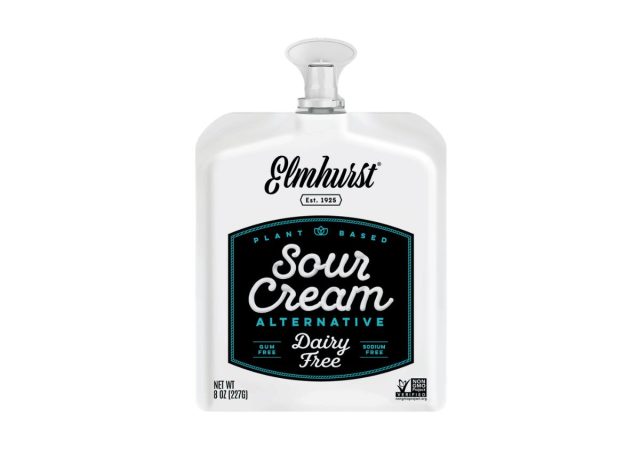
Per 2-tbsp serving: 60 calories, 6 g fat (4.5 g saturated fat), 0 mg sodium, 2g carbs (0g fiber, 0g sugar), 1g protein
For those looking for a dairy-free sour cream substitute, Elmhurst makes a delicious, silky alternative that has the same tang as your regular sour cream. Made with natural ingredients like oat milk, coconut oil, sunflower oil, and hemp protein, this sour cream is perfect for your baked potato. This Elmhurst substitute is—get this—completely sodium-free and contains no cholesterol, and all ingredients are non-GMO. Lastly, their convenient squeeze pouch is 100% BPA-free. The thing is, this is a small batch, limited edition sour cream, so get it while you can!
Best: Kalona Organic Sour Cream
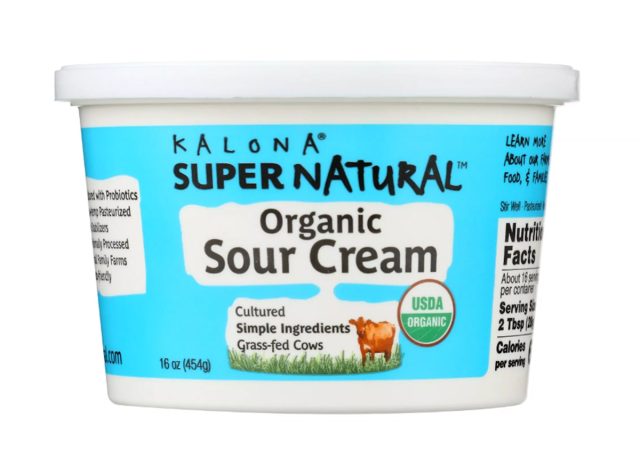
Per 2-tbsp serving: 60 calories, 5 g fat (3 g saturated fat), 15 mg sodium, 2 g carbs (0 g fiber, 1 g sugar), 1 g protein
If you’re looking for a USDA-certified organic sour cream, look no further than Kalona Organic Sour Cream. Kalona’s sour cream is minimally processed through low-temperature pasteurization which, according to their website, kills “unwanted pathogens, but not the helpful bacteria that our bodies need.” Additionally, Kalona’s unique flavor makes it great on foods not usually associated with sour cream, like fruit.
Best: 365 Organic Lowfat Sour Cream
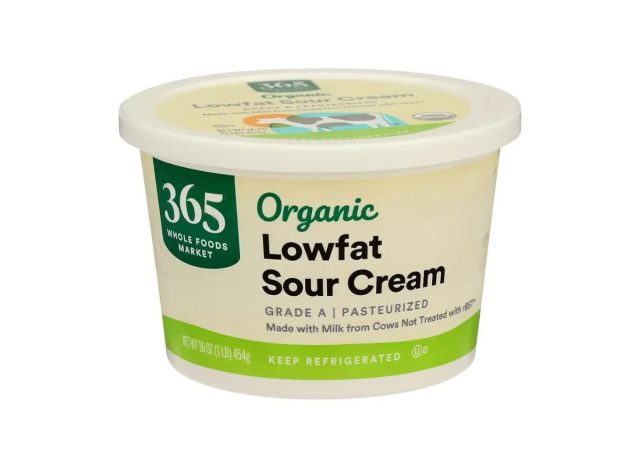
Per 2-tbsp serving: 40 calories, 2.5 g fat (2.5 g saturated fat), 20 mg sodium, 3 g carbs (0 g fiber, 2 g sugar), 2 g protein
With no added sugar and 2 grams of protein, Whole Foods’ Sour Cream is a great choice for those looking for a low-fat option. This USDA-certified organic sour cream also provides 6% of your daily vitamin A intake, with only 2.5 grams of fat per 2 tablespoons. Additionally, all stabilizers in this sour cream are sourced from natural ingredients such as guar gum, agar, and organic locust mung bean gum, so you don’t need to worry about the health consequences of any synthetic food additives.
Best: Good Culture
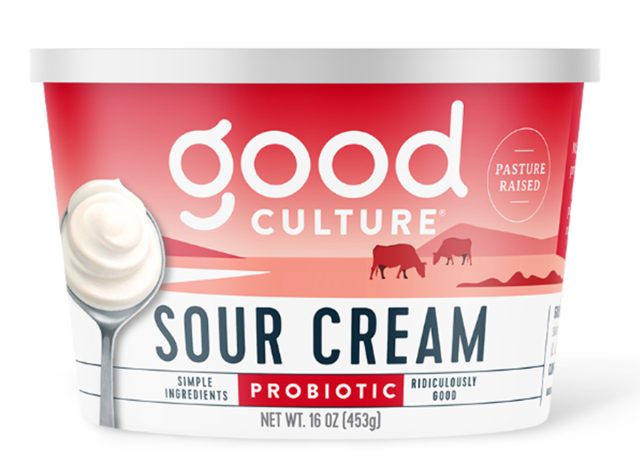
Per 2-tbsp serving: 60 calories, 5 g fat (3.5 g saturated fat), 20 mg sodium, 2 g carbs (0 g fiber, 1 g sugar), 1 g protein
Amanda Sauceda, MS, RD, registered dietitian, feels that Good Culture has one of the best-tasting sour creams on the market. “They have simple ingredients, a rich texture, and its a source of probiotics, thanks to the live and active cultures,” she shares. Plus, it’s made with milk from pasture-raised cows.
The Worst Sour Creams
Worst: Land O’ Lakes Sour Cream
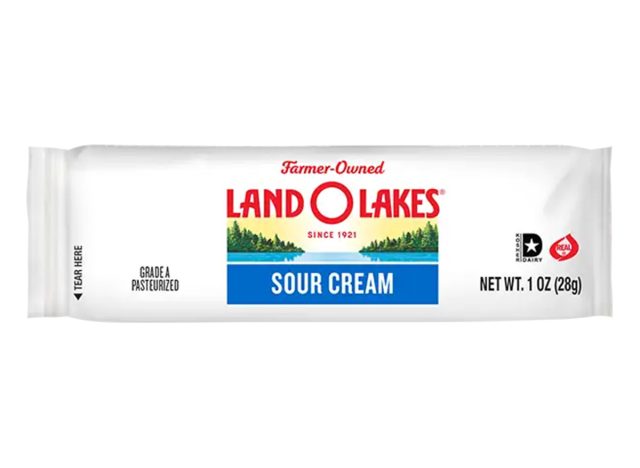
Per 1-ounce serving: 60 calories, 5 g fat (3.5 g saturated fat), 25 mg sodium, 2 g carbs (0 g fiber, 0 g sugar), 0 g protein
It was a bit hard to choose a “bad” sour cream, as most brands lie within a similar health ballpark. We decided that Land O’ Lakes, however, does come with a higher sodium count than most other brands without any protein, and only a scant potassium boost. Additionally, this sour cream is filled with different additives and preservatives with which some consumers may not be comfortable, such as modified food starch and sodium hexametaphosphate, the latter of which has proven to be safe for consumption, although it seems unnecessary given the fact that so many other brands do just fine without it.
Worst: Food Lion Original Sour Cream
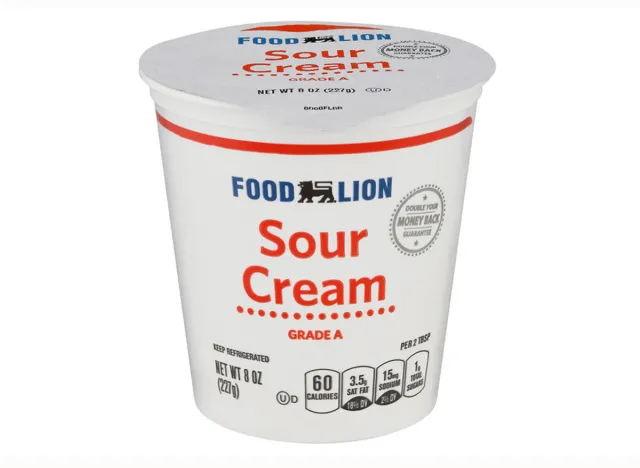
Per 2-tbsp serving: 60 calories, 5 g fat (3.5 g saturated fat), 15 mg sodium, 1 g carbs (1 g sugar, 0 g fiber) <1 g protein
Not to say that this sour cream is “bad”, but it isn’t the best out there. While it does offer some major flavor and it doesn’t have any sketchy ingredients in the container, it doesn’t have any bells and whistles to make us want to crown it one of the “best”. If you have the option, you can reap more health benefits if you select a different variety. But if this sour cream happens to end up in your shopping cart, you will be okay.

